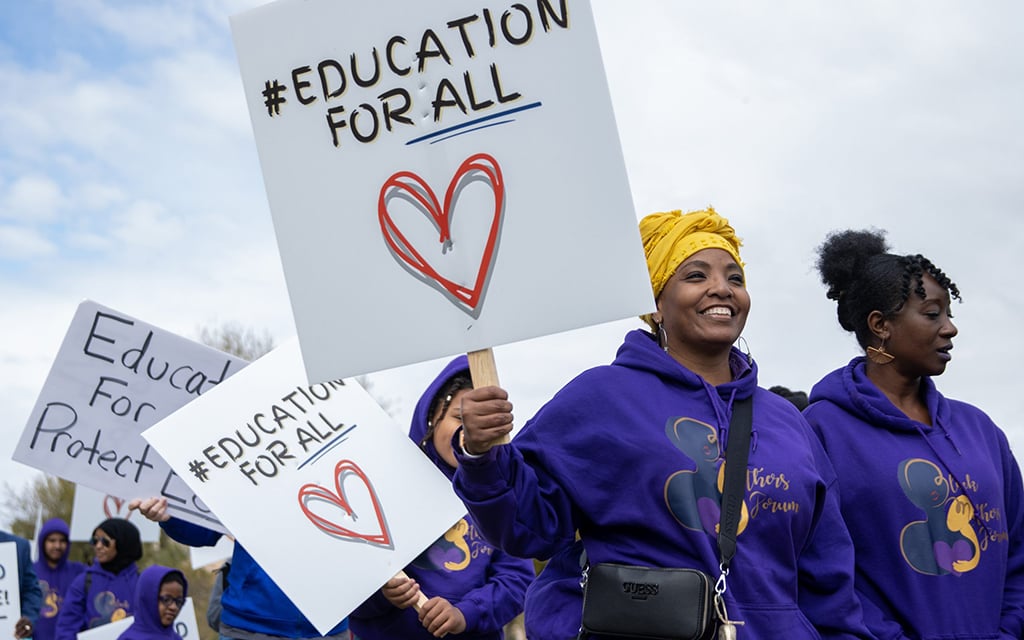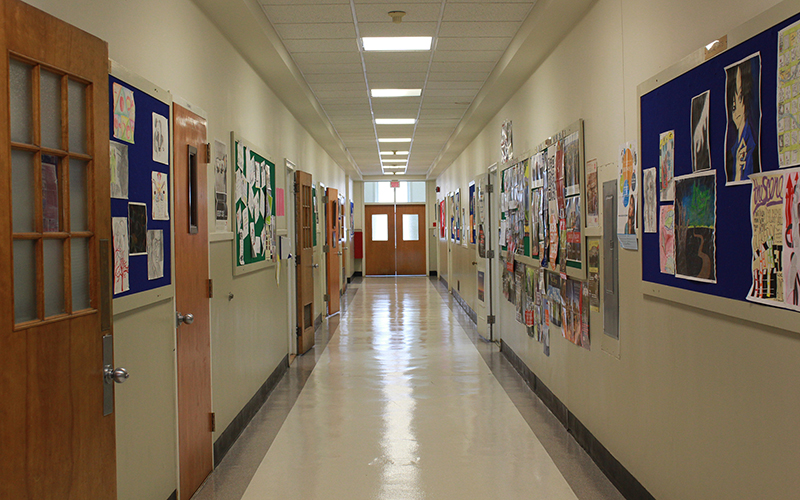
Nyeshua Miller, a teacher at a Black Mothers Forum “microschool,” joins other forum members and marchers who support Empowerment Scholarship Accounts, known as ESAs or school vouchers, in Phoenix in March 2023. Common Sense Institute Arizona has released a report contending that though public school enrollment is in decline, the ESA program may not be solely to blame. (File photo by Emily Mai/Cronkite News)
PHOENIX – The Common Sense Institute Arizona has released a report on Arizona’s Empowerment Scholarship Account program, also known as ESAs or universal school vouchers. The report contends the state-funded program “has (and hasn’t) altered Arizona’s K-12 landscape.”
Since its expansion last year, ESA program enrollment has grown from 12,000 students to 77,000, according to the report.
Key findings from the report contend that while ESA enrollment is slowing down and public school enrollment is in decline, the ESA program may not be solely to blame.
An average ESA in the 2022-2023 school year is worth approximately $6,966. Arizona’s ESA program is geared toward funding education from private schools, educational providers and other vendors using state tax money. Critics of ESAs have said the universal school voucher program takes money away from already-underfunded public schools while also lacking transparency. According to the institute’s report, ESA vouchers will cost the state $750 million in fiscal 2024. However, according to ESA-opposing Save Our Schools Arizona, the program will cost the state $825 million.
Citing demographic changes in Arizona for the “steady state” stagnation in applications for ESAs, the institute’s Executive Director Katie Ratlief said at a virtual conference Wednesday that the state of Arizona will see its largest decline in the 5- to 17-year-old population this year.
“We’re projecting that we will continue to see declines every year,” Ratlief said.
Against the backdrop of the COVID-19 pandemic, ESAs, politicized school policies, a decline in birth rates and the declining number of students enrolled in schools, funding allocations will be affected, according to Glenn Farley, institute director of policy and research.
“What that means is that the total K-12 system in Arizona is going to be fighting over a smaller pie. That’s the district schools, the charter schools, the private schools and homeschooling-slash-microschooling all now competing for a much smaller pie,” Farley said, noting that as population growth keeps slowing, enrollment in ESAs and in all types of schools will continue to decline.
However, some public school advocates blame ESAs for straining the state education funding.
“The Common Sense Institute tries to say that because district school enrollment is down, that this is an affordable program. What they don’t say is that we’ve cut over $2 billion in funding to our state because of the elimination of the progressive income tax and replacement of that with a flat tax, which primarily benefited wealthy people,” said Dave Wells, research director at the Grand Canyon Institute.
With an ongoing teacher staffing shortage and the added loss of state revenue from the tax change, Wells said the expansion of the universal voucher program has limited the state’s ability to fund district schools reliant on government funding.
“This program is disproportionately hurting lower-income families and helping higher-income families,” he said.
The institute claims that 80% of ESA funds go to either lower- or middle-income families enrolled in charter or private schools, however, several organizations have released evidence suggesting otherwise. A K-12 and ESA Formula Funding Overview from the Joint Legislative Budget Committee in 2023 found that in large school districts that receive state funding, per-pupil funding is $700 less than an ESA voucher is worth, and in public high schools, per-pupil funding is $900 less. In an analysis of the Arizona Department of Education’s 2024 quarterly report on ESAs, ABC15’s Garrett Archer found that 78% vouchers go to students already enrolled in private school or homeschooled.
“Based on the latest report, it appears that even the Common Sense Institute – which is highly biased in favor of ESA vouchers – agrees that the program will continue to cost our state $700 million or more each year for the foreseeable future,” the Arizona Education Association said in an emailed statement following the release of the institute’s report. “Arizona is facing a massive budget deficit; every dollar we spend subsidizing private school tuition for the wealthy is a dollar we can’t spend on teacher salaries or textbooks for the public schools that 90% of Arizonan families rely on.”

